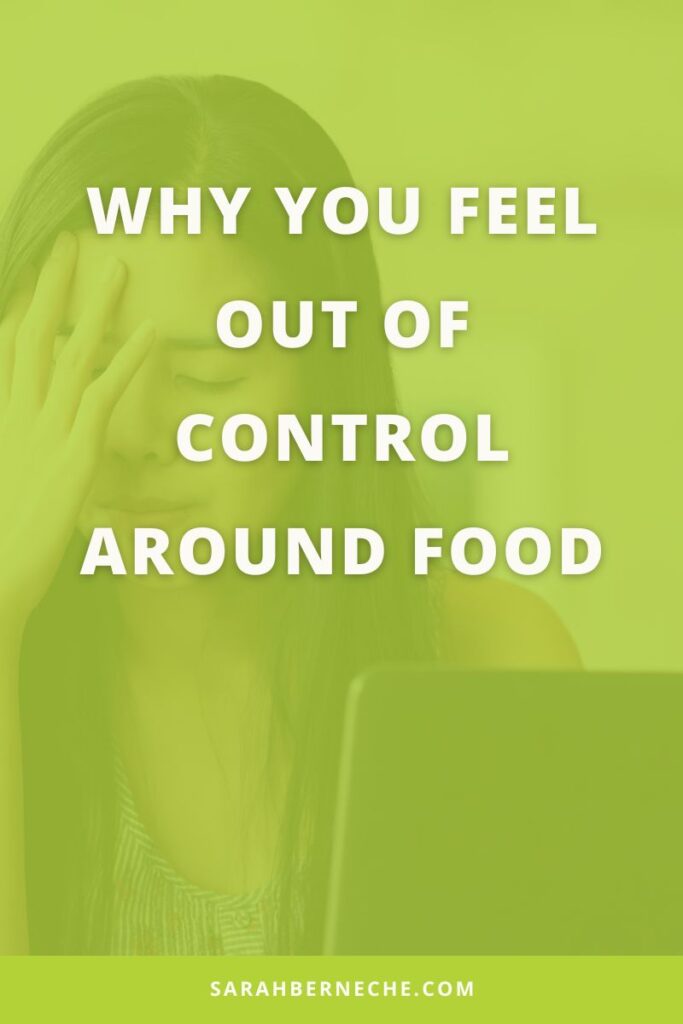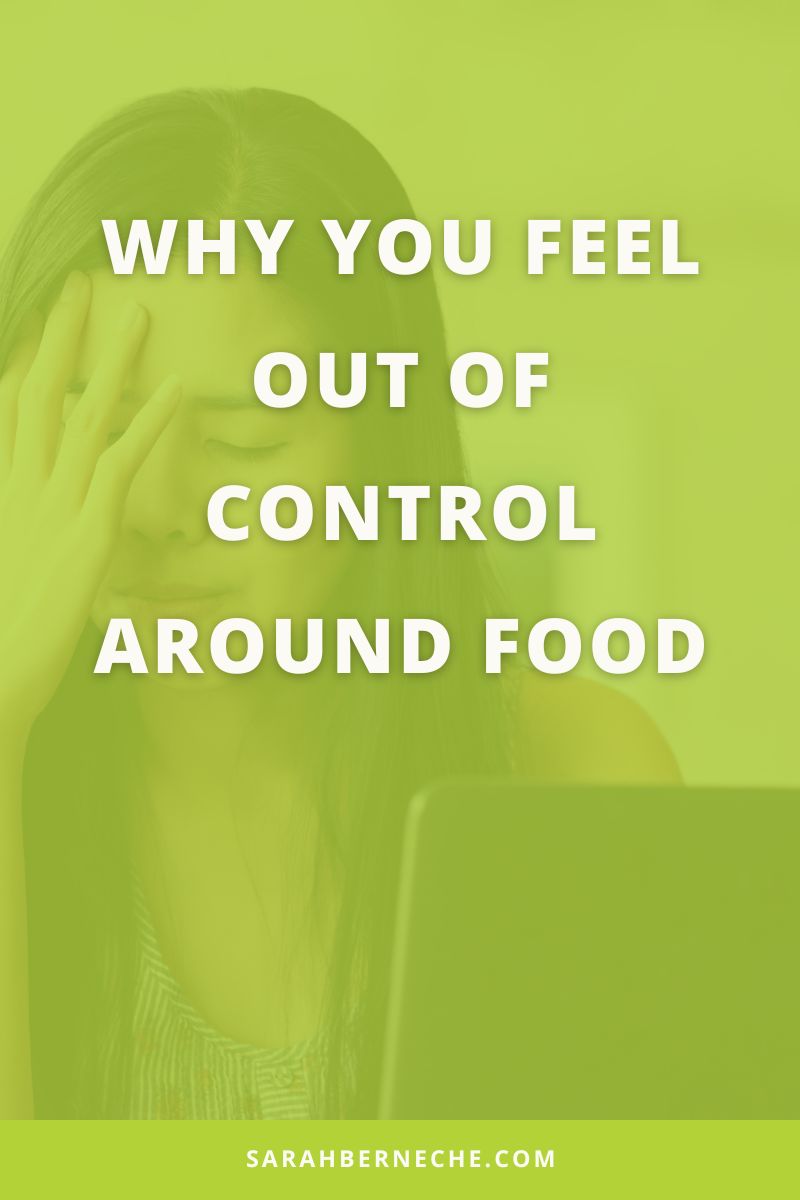Have you ever thought to yourself, “If I could just stop feeling out of control around food…life would be great”?
Maybe, like many folks I’ve worked with, you started actively dieting and watching what you eat because you’ve got it together in every area of life…except for food. Most (all?) people who struggle with food tend to be ambitious, hard-working, and accustomed to getting the things they work hard for.
This can make feeling out of control around sour cream and onion chips, milk chocolate, rocky road ice cream, or just a really great cereal all the more challenging. “Why can’t I get this one right right?” you wonder.
I mean, I’m not one to judge — I went to nutrition school half-hoping I would discover “The Secret” to effortless and life-long food control, believing the “perfect diet” would bring me peace, sanity, a great relationship, a thriving social circle, a rewarding career, access to a sprawling Italian villa overlooking Lake Como, etc. You know the dream. (I still fantasize about the villa.)
Maybe you started to focus more on food and your body size much earlier. Many people start restricting their food intake — or have their food decisions dictated by others, like a parent — in response to things that feel out of control.
Except that eventually, as I’ve talked about before, food starts to feel out of control, too.
The Italian villa starts to sound less sexy when you start thinking about how to manage the impending food triggers.

Diets and eating programs fail because they double down on food rules instead of addressing why you’re drawn to food control in the first place.
Before someone @’s me for being “too deep,” the active pursuit of weight loss never exists in isolation in a world where thinness is coded for success, attraction, health, and so much more, and where straight-sized people enjoy access to things (e.g. travel, clothing options, theatre seating, restaurant booths, etc) that higher-weight people don’t. If we were in a ring competing against lions, tigers, and bears for our lives, no one would say, “You care too much about surviving. I’m just doing this for myself.”
This entire process is amplified for trauma survivors. While dieting leads most people to feel out of control around food, it’s even more challenging for people with highly dysregulated nervous systems. Because diets “work” for very limited periods, intense feelings of being out of control often surface when food stops working to contain everything happening inside.
Today I’m rolling out 7 reasons you might feel out of control around food, why control isn’t the answer, and what you can do instead. And if you want help in shifting your relationship with food for good, I am actively accepting a few new clients. You can book your complimentary call by clicking here.
Reasons You Feel Out of Control Around Food
Some reasons include:
You feel out of control around food because…you’re going too long without eating or getting too hungry
If you go too long without food, the production of hunger hormones, namely ghrelin, will ramp up in response — while decreasing the amount of leptin, the fullness hormone.
What does this mean for you? Most people find it’s more difficult to get full and satisfied if they’ve let themselves get too hungry or gone too long without eating. Going long periods without food or not getting enough food can make it more difficult to get full and satisfied the next time you eat because of the intricate dance these satiety hormones play.
Even though Intermittent Fasting and forgoing snacks are all the rage, these diet strategies — like all diet interventions — do not support long-term peace and safety with food.
Is there merit to going blocks of time without eating? Sure. Digestion tends to work better when there’s time between meals and snacks. But your system gets plenty of time to do this while you’re sleeping and in between eating times, even if you’re snacking regularly.
…And maybe you’re not eating enough overall
Adjacent to my first point, not eating enough food overall can also increase hunger hormones and slow the production of leptin. Even the mere thought of restricting your food intake does this. During “active” times of food restriction, you may have found yourself increasingly drawn to food, preoccupied with food, and hungrier than normal.
This may also apply if you have ADHD and have a hard time eating regular meals, or struggle to maintain any kind of routine or structure in your day. Some trauma survivors have difficulty establishing a routine, which can lead to chaotic or imbalanced eating patterns. Hunger and fullness cues aren’t always available or trusted, which can make cultivating a healthy relationship with food challenging.
That said, I think there are workarounds for getting enough to eat…even if it doesn’t look like 3 standard meals and 2+ snacks.
You feel out of control around food because…you’re not allowing yourself to fully enjoy food
Do you ever eat a slice of chocolate cake, but spend the entire time berating yourself for eating it?
Having foods you deem “bad,” “unhealthy,” or “forbidden” can lead to feeling out of control around food. Maybe the foods you think you shouldn’t eat or the ones you believe you should limit are the ones you feel the most compulsive around.
For one thing, thinking you shouldn’t be eating something can decrease the level of enjoyment you derive from the experience, potentially leading you to eat to the point of discomfort or to feel less satisfied. It can also contribute to thoughts like, “This is the last time I’m having this.” Thoughts like this can result in feeling more out of control around the food as the brain anticipates future restrictions.
For trauma survivors, the concept of permitting yourself to eat foods can feel really fraught. “Enjoyment” may bring up some really conflicting thoughts to begin with, especially around food. Secondly, diet recovery models like Intuitive Eating are not trauma-informed (no shade, just calling a spade a spade).
Because of this, they do not address the fragmentation that comes part and parcel with trauma or a lot of activation in the system. A part of you might want to eat something when another part of you might not want it, which can lead to a lot of confusion or what I informally call “mixed consent.” This can lead to feeling out of control around a particular food or food group for a number of reasons, not least because the food may not actually be what is needed for satisfaction.
…Or your meals lack satisfaction
You might also feel out of control around food if your meals and snacks are bland. If you’re limiting additions that make food delicious — namely condiments, sauces, fats, salt, and other ingredients — this can certainly be the case. While you can get everything you technically need without added flavour, it can be tough to get satisfied and to stop thinking about food when a meal doesn’t “hit the spot.”
As I’ve said, “pleasure” and “enjoyment” with food can get complicated for trauma survivors. In addition to what I’ve shared, it can be really difficult to access pleasure generally because it’s less (or not at all) physiologically available.
Food satisfaction can also be associated with the fear of criticism, rejection, punishment, and so on and can make “enjoyment” confusing. It’s really common for trauma survivors to eat in distracted ways, to feel disconnected from food, and to dissociate at meals by using alcohol, drugs, television, and other strategies.
Can’t resist a little soapbox time: some people believe mindful eating is the answer here, but in my experience, those who would benefit most from it are often unable to get that close to food without dissociating. “Mindful eating” is a skill that requires safety, time, co-regulation and regulation, and titrated or “paced” interventions to develop.
You feel out of control around food because..food is being used as your only coping mechanism
If you’ve been around here for any length of time, you know I don’t vilify emotional eating. Our food choices are often at least partly emotion-driven; preference is highly emotional, no? All things considered, emotional eating is a relatively benign coping mechanism.
The main difference between emotional eating as a “problem” and emotional eating as a normal and benign coping strategy is the presence of choice.
Many people I’ve worked with find they can’t stop emotional eating (emotional eating and binge eating often come as a package).
Secondly, many people automatically go toward food to self-soothe and comfort, a practice they likely learned in the absence of genuine support. It doesn’t feel like something they’re choosing so much as it is something that just happens to them.
Ordering pizza on a Friday night after a long week is one thing.
Dissociating whenever you open a bag of chips or useing food to cope with any and all uncomfortable emotions, sensations, memories, and so on is often a different story. Food — restricting it and eating it — doesn’t solve for x, y, and z.
For trauma survivors, food can be particularly loaded. Sometimes, food is used as comfort or distraction from flashbacks or triggers, or to dissociate and disconnect from surroundings. Because our bodies are containers for emotions, sensations, memories, and more, trauma survivors may look to food to cope with these overwhelming experiences when they’re alone.
Emotional eating can become a habitual response to distress, leading to a sense of being out of control around food. From a nervous system perspective, food is often used to stimulate or ground, which may mean somatic work is recommended or required for a different relationship with food to take place.
…Or because of hormonal issues or imbalances
Blood sugar dysregulation can certainly impact your relationship with food. When you’re not able to use the glucose you’re consuming as well as you did before, it can be a disorienting experience. I commonly see this in folks struggling with insulin-resistant PCOS, but it’s common in other people as well (see: Type II Diabetes.)
Many people report their binge eating is worse or they are more susceptible to binge or emotional eating when they’re menstruating or the week or two before that. Generally, this is due to a combination of restrained eating and feeling hungrier due to the processes happening in your body. People who don’t diet do not tend to feel more out of control around food when they’re experiencing normal hormonal fluctuations.
It’s also possible that your overall diet lacks nutrient variety
Lastly and less commonly, lack of nutrient variety can also lead to feeling out of control around food. Many people think of micronutrient deficiencies, like iron or B12, when they think of this. But it’s also possible to be deficient in macronutrients, namely carbohydrates, fat, and protein, or overall energy. Eating enough food is a great safeguard against this, but it’s still possible to under-eat a macronutrient for your body’s needs even if you’re technically meeting your energy requirements.
What questions do you have about feeling out of control around food?

Comments +